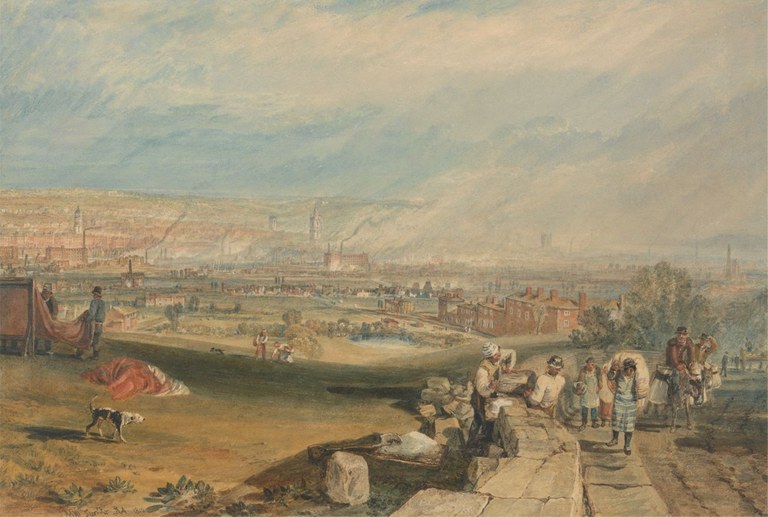Vortrag // Sarah Gould: The Smoky Canvas: Pollution and Paint in 19th Century British Art
Termindetails
Wann
von 18:15 bis 20:00
Wo
When it comes to the iconic images of the industrial revolutions, it was 19th-century British landscape painting that first made visible the rise of the “dark Satanic mills.” Artists such as Philippe-Jacques de Loutherbourg, Joseph Mallord William Turner, and James McNeill Whistler depicted urban and ecological transformations through industrial sites and cities under clouds of smoke. But these paintings, I argue, were not simply representations. My talk will look at how the causal relationships between pollution, visuality, and painting came to be diagrammed over the long 19th century. My aim is to consider painting not just as a document or illustration, but as an agent and mediator of environmental change.
In this talk I will attempt to reinterpret the link commonly assumed by critics and art historians between atmospheric pollution and the dissolving of form and subject, i.e., the oft-repeated idea that industrial scenes encourage painters to free their brushstrokes. Turner’s willingness to dispense with boundaries and clear contours has led art historians to consider some of his work as protomodernist or abstract avant-l’heure, suggesting that his preoccupation with pollution helped liberate his brushwork. This perspective implies a causal connection between his portrayal of atmospheric fog and formal experimentation—a reading that, as I will show, is ultimately embedded in an abstract understanding of air and pollution. In fact, such an interpretation rests on a metaphorical definition of form that cannot do justice to its historical determinisms. By re-examining the context in which the works under consideration were produced, I aim to qualify and complicate formalist accounts by exploring how the notion of pollution itself was formulated by 19th-century chemists and industrialists as something profoundly nebulous, thereby dissimulating the responsibility of polluters both in Britain and in its colonies. Dilution is a key concept in this respect, characteristic of both pollution and painting itself. Visual art, I argue, at once participated in the official discourse of a triumphant industrial capitalism and resisted strategies that sought to redirect attention away from the authors of environmental degradation.

Sarah Gould is Assistant Professor at Université Paris 1 Panthéon Sorbonne, where she focuses on the study of British art in both her research and teaching. Her academic interests lie at the intersection of the material and ecological meanings of art. She is currently working on two monographs, finishing a book on the Victorian painter John Everett Millais and the other on pollution in and of painting and visual culture in nineteenth-century Britain.
[Caption: (Public Domain): https://collections.britishart.yale.edu/catalog/tms:5508 Joseph Mallord William Turner, Leeds, 1816, Yale Center for British Art]
TEILNAHME:
Die Teilnahme ist kostenlos.
Eine Teilnahme in der Carl Friedrich von Siemens Stiftung vor Ort ist den Teilnehmerinnen und Teilnehmern des Doktorierendenkolloquiums vorbehalten. Eine Teilnahme per Zoom ist jederzeit möglich: https://us02web.zoom.us/meeting/register/HZ0HpTDgRRW6ciX38qgCGA | Das Mitschneiden der Veranstaltung oder von Teilen der Veranstaltung sowie Screenshots sind nicht gestattet. Mit der Teilnahme akzeptieren Sie diese Nutzungsbedingung.
